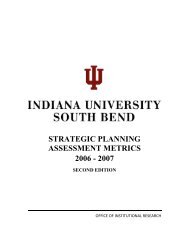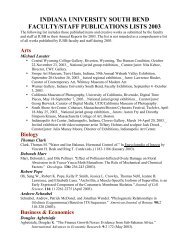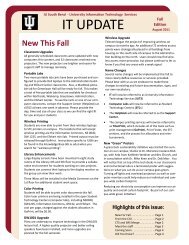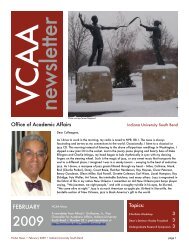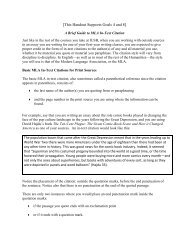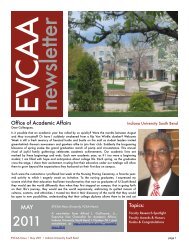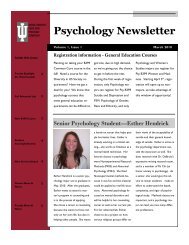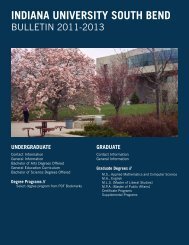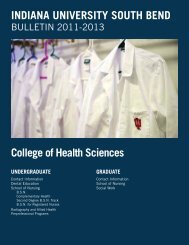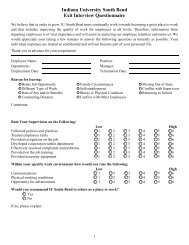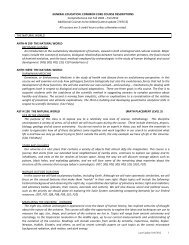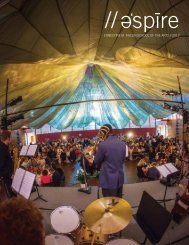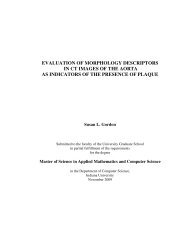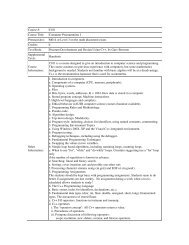Current version - Indiana University South Bend
Current version - Indiana University South Bend
Current version - Indiana University South Bend
Create successful ePaper yourself
Turn your PDF publications into a flip-book with our unique Google optimized e-Paper software.
SCHOOL OF EDUCATION4GRADUATE DEGREES 4243<br />
PROFESSIONAL EDUCATION SERVICES<br />
SPECIAL EDUCATION<br />
Office of Education Student Services<br />
Greenlawn Hall 120<br />
(574) 520-4845<br />
www.education.iusb.edu<br />
Students seeking initial licensure at the graduate level<br />
in any area of special education must take and pass the<br />
Praxis I® Preprofessional Skills Test by the end of the<br />
first 6 credit hours of graduate course work.<br />
Students may only transfer 6 credit hours of course work.<br />
MASTER OF SCIENCE IN EDUCATION, SPECIAL<br />
EDUCATION<br />
Graduate students may complete a Master of Science<br />
in Education, Special Education degree. Students<br />
complete a minimum of 36 credit hours for this degree.<br />
In most cases, graduate students may use some of the<br />
course work taken for licensure toward their graduate<br />
degree in special education. Students are advised on an<br />
individual basis. Students interested in discussing degree<br />
requirements should contact the Office of Education<br />
Student Services to arrange an appointment. All degreeseeking<br />
students must apply separately for admission to<br />
the Master of Science in Education, Special Education<br />
Program. Students must have, and maintain, a 3.0 GPA<br />
while pursuing the degree.<br />
GRADUATE CERTIFICATION STUDENTS<br />
Graduate students interested in completing a certification<br />
in mild interventions are advised on an individual<br />
basis. Students must complete an application for<br />
admission to the Graduate Certification Program in Mild<br />
Interventions. After completing an application, students<br />
should arrange for an appointment to meet with an<br />
academic advisor. In most cases, students must supply<br />
a transcript from their undergraduate degree program,<br />
and from all other postbaccalaureate programs, in order<br />
to plan an appropriate course of study with an advisor.<br />
Students must earn and maintain a 2.5 GPA while<br />
completing certification requirements.<br />
COUNSELING AND HUMAN SERVICES<br />
The IU <strong>South</strong> <strong>Bend</strong> Counseling and Human Services<br />
Program provides quality professional education<br />
to graduate students seeking counseling careers in<br />
education, mental health services, business, and<br />
community or government agencies. The curriculum<br />
provides theoretical courses and supervised professional<br />
experiences. Internship experiences are also offered for<br />
those seeking state licensure.<br />
Students enrolled in the program come from a variety<br />
of undergraduate backgrounds—the majority of students<br />
are employed full time while attending graduate school.<br />
Students may choose from the community or school<br />
counseling tracks. Counseling graduates successfully<br />
serve in institutions of higher education, in area<br />
personnel departments, in administrative positions in<br />
social agencies, as well as counsel in public and private<br />
counseling agencies. Graduates in school counseling<br />
are prepared to serve grades K-12 and have jobs in area<br />
schools.<br />
The program is limited to 24 students selected each year<br />
who work together over a three-year period to complete<br />
the degree of Master of Science in Education, Counseling<br />
and Human Services.<br />
Addictions Counseling Track<br />
The Addictions Counseling Track is designed to train<br />
professionals who will offer addiction counseling services<br />
in our community and the surrounding areas. The chief<br />
features of the program are a comprehensive 60 credit<br />
hour curriculum that satisfies <strong>Indiana</strong> requirements for<br />
professional licensure as a Licensed Clinical Addictions<br />
Counselor. The program also contains several field<br />
experiences designed to train students in the most<br />
effective way possible to become addictions counselors.<br />
(All courses are 3 credit hours, unless otherwise designated.)<br />
First Year Courses<br />
EDUC-G 500<br />
EDUC-G 506<br />
EDUC-G 522<br />
EDUC-G 523<br />
EDUC-G 575<br />
EDUC-P 514<br />
Orientation to Counseling<br />
Personality Development: Growth<br />
of Normal and Deviant Styles<br />
Counseling Techniques<br />
Laboratory Counseling and<br />
Guidance<br />
Multicultural Counseling<br />
Life Span Development: Birth-<br />
Death<br />
Second Year Courses<br />
EDUC-G 505 Individual Appraisal: Principles<br />
and Procedures<br />
EDUC-G 510 Introduction to Alcohol and Drug<br />
Counseling<br />
EDUC-G 513 Legal and Illegal Drugs of Abuse<br />
EDUC-G 532 Introduction to Group Counseling<br />
EDUC-G 585 Contemporary Issues in Counseling<br />
EDUC-G 590 Research in Counseling and<br />
Guidance<br />
Third Year Courses<br />
EDUC-G 507 Lifestyle and Career Development<br />
EDUC-G 511 Screening and Assessment of<br />
Alcohol and Drug Problems<br />
EDUC-G 512 Counseling Approaches with<br />
Addictions<br />
EDUC-G 514 Practicum in Alcohol and Drug<br />
Counseling (taken twice)<br />
EDUC-G 550 Internship in Counseling (taken<br />
twice)<br />
EDUC-G 592 Seminar in Drug and Alcohol Abuse<br />
Prevention



